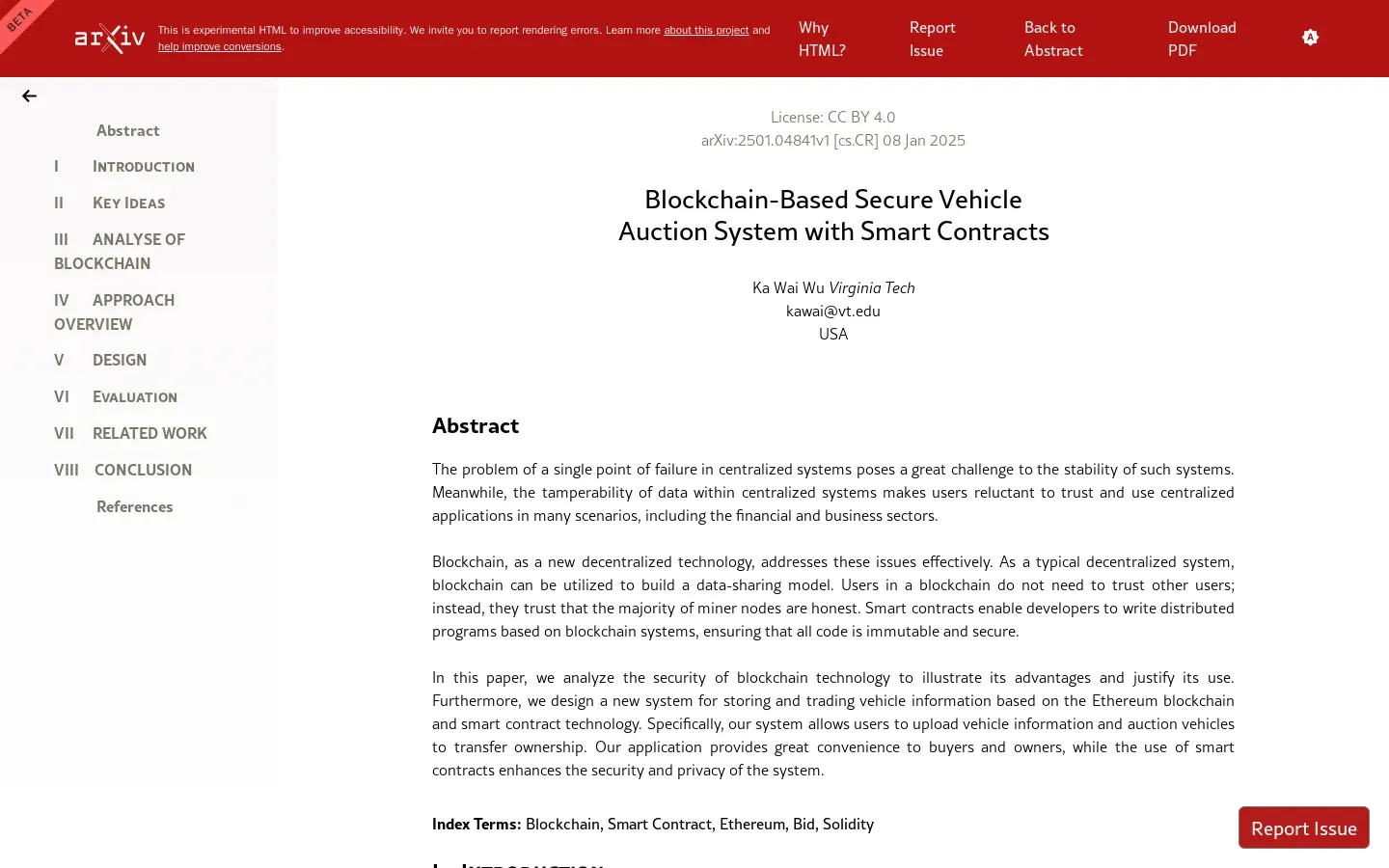
Blockchain Technology Enhances Vehicle Auction Security Systems
/ 4 min read
Quick take - Recent research into blockchain technology and smart contracts reveals their potential to enhance cybersecurity, improve data sharing mechanisms, and streamline operations across various sectors, while also highlighting the need for further exploration of implementation challenges and future applications.
Fast Facts
- Recent research highlights blockchain’s potential to enhance security and scalability in critical sectors like healthcare and supply chain management.
- The study emphasizes the development of secure data-sharing mechanisms to ensure privacy and integrity, addressing challenges like data breaches and regulatory compliance.
- Smart contracts are identified as transformative tools that can automate processes, reduce intermediaries, and build trust among stakeholders across various industries.
- Blockchain scalability solutions, such as public blockchain sharding, are explored to improve efficiency in handling high transaction volumes.
- Future research directions include enhancing security for IoT devices and developing decentralized voting systems, with a focus on practical implementation and real-world testing.
In the rapidly evolving landscape of cybersecurity, the convergence of blockchain technology and smart contracts represents a pivotal shift in how we approach security, data integrity, and trust. As organizations increasingly adopt decentralized solutions to address vulnerabilities in traditional systems, the Ethereum platform emerges as a foundational pillar. This decentralized environment not only supports the development of secure applications but also enables innovative approaches to data sharing and management. The implications of this technology stretch far beyond mere transactional efficiency; they touch upon critical areas such as supply chain security, healthcare data management, and decentralized identity systems.
Research findings reveal that enhanced security protocols for IoT devices could revolutionize industries reliant on interconnected technologies. With the proliferation of Internet of Things (IoT) devices, the potential attack surface has expanded dramatically, making robust security measures imperative. Blockchain technology offers a unique solution through its immutable ledger and decentralized nature, which can significantly bolster the security posture of IoT ecosystems. By implementing smart contracts that automatically enforce compliance and auditing measures, organizations can ensure real-time monitoring and response to threats.
The exploration of secure data sharing mechanisms is another promising avenue illuminated by recent research. In contexts like smart grids and healthcare, where privacy and integrity are paramount, blockchain can facilitate auditable data exchanges without sacrificing confidentiality. This capability is especially relevant in healthcare data management, where patient information must be shared among multiple stakeholders while adhering to stringent regulatory requirements. The automation provided by smart contracts could streamline these processes, ensuring that only authorized entities access sensitive data while maintaining an immutable record of all transactions.
As we delve deeper into the architecture and design of decentralized applications (dApps), it becomes clear that sharding will play a critical role in addressing scalability challenges associated with blockchain networks. By partitioning data across multiple nodes, sharding enhances transaction throughput, allowing public blockchains to handle higher volumes without compromising performance. This scalability is crucial for broader adoption in various sectors where high transaction rates are common.
A significant outcome of this research is the emphasis on automated compliance solutions, which leverage blockchain’s transparency to simplify regulatory adherence across industries. As organizations face increasing scrutiny from regulators regarding data protection and privacy, the ability to demonstrate compliance through traceable and verifiable records will be invaluable. This approach not only alleviates the burden of manual audits but also fosters greater trust among consumers who are becoming more conscious of their data rights.
Despite these advancements, limitations still exist within the current framework that warrant further investigation. For instance, while Ethereum and Solidity have enabled remarkable innovations in smart contract implementation, there remains a need for enhanced tools and frameworks to support secure coding practices. Additionally, the complexity inherent in these technologies necessitates ongoing research into user-friendly interfaces that can bridge the knowledge gap for non-technical stakeholders.
The transformative potential of blockchain technology is evident in its ability to enhance security, privacy, and efficiency across various domains. Yet, as we look forward, it is essential to recognize that the journey does not end with implementation; continuous evaluation and refinement of these systems will be crucial for long-term viability. The future landscape promises exciting developments as researchers push boundaries to explore new methodologies and applications within this dynamic field. By addressing existing challenges head-on and fostering collaboration between technologists and regulators, we can harness the full power of blockchain to create a safer digital future.



